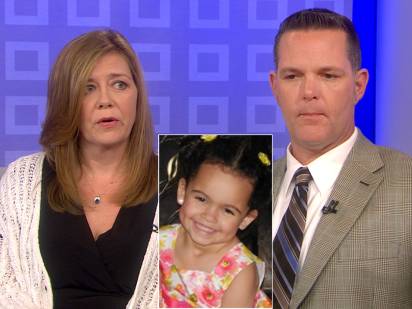By Glenn Smith
With only long-shot hopes of winning her back, Dusten Brown announced during a press conference in Oklahoma that he was abandoning his legal fight to win back the little girl he called “his princess.”
Brown wiped his eyes and choked back tears as he described the void in his home since Veronica's departure and the pain of seeing her empty room full of toys she left behind. But Brown said he could no longer stomach the prospect of her caught at the center of a contentious legal fight and in the glare of national media.
“It was no longer fair for Veronica to be in the middle of the battle,” he said. “I love her too much to continue to have her in the spotlight.”
By Levi Rickert
He was forced to relinquish custody of Veronica on September 23.
He is doing so that Veronica can now have a normal life--“free of the spotlight.”
”For four years, Veronica has been in the media. I love her too much for her to be in the spotlight,” said a contrite Brown, who broke down several times and found it difficult to speak during the press conference as he read a prepared statement.
ICWA in trouble?
Unfortunately, the case has implications beyond the fate of Veronica Brown.
Tribal Leaders Worry 'Baby Veronica' Case Sets Precedent Against ICWA
By Ashlei King
"When you look at the whole picture, it wasn't about one child. It was about 500-and-some-odd nations," said Muscogee (Creek) Nation Principal Chief George Tiger.
Although little Veronica is Cherokee, Tiger said the battle over Veronica sets a precedent for all tribes.
"That was a landmark decision that meant so much to the tribal leaders and tribal governments in general. It's kind of a sad day," he said.
No matter how fit or even wonderful both families are or may be, it is disheartening that Veronica was ever in a position to know one mom and dad at bedtime one day, and the next night to be in a different home with another mom and dad. The fact that she did is unquestionably a failure of the legal systems as to this child. It is the judicial systems placing upon the little head of Veronica the issues many courts had an opportunity to and should have resolved under the legal right of Veronica to a present best interest hearing.
In legal matters, any child--including Indian children--hold legal rights and claims under various tribal, state, federal and/or international law. These legal rights are those of the child and independent of any other party. Failure of judicial systems to consider these independent rights and claims due the child is truly a failure to protect the most vulnerable of our societies and puts upon children the historic semblance of property. All our children deserve and are legally guaranteed more from our judicial systems. For that failure in these matters, my apologies to dear Veronica and both her families because it is now the two families who are left to pick up the pieces of Veronica and help her heal.
Today finds me in a place where continued litigation only places my client at the heart of potentially years of legal proceedings with no guarantee of outcome. This is not in the interest of my client, and it is Veronica who I was appointed to represent. It is time for all of the United States and Indian country, the legal systems, and any acts growing out of self-motivation or hatred to quietly step aside. Yes, there remains work to do for children and Indian children, but it is time to allow Veronica and her families to heal and grow together in private.
















